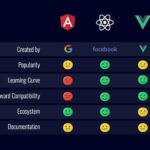The most important trend future programming language for the next decade will be using machine learning and artificial intelligence to automate much of coding. AI and machine-based learning can automate coding and help programmers write faster and better code.
Top Programming languages for future
- Python
- R
- JAVA
- Swift
- MATLAB
- Aurdino
- Scala
- Kotlin
Python
Python is an object-oriented programming language created by Guido Rossum in 1989. It is ideally designed for rapid prototyping of complex applications. It has interfaces to many OS system calls and libraries and is extensible to C or C++. Many large companies use the Python programming language, including NASA, Google, YouTube, BitTorrent, etc.
R
R is a programming language and free software developed by Ross Ihaka and Robert Gentleman in 1993. R possesses an extensive catalog of statistical and graphical methods. It includes machine learning algorithms, linear regression, time series, statistical inference to name a few. Most of the R libraries are written in R, but for heavy computational tasks, C, C++ and Fortran codes are preferred.
R is not only entrusted by academic, but many large companies also use R programming language, including Uber, Google, Airbnb, Facebook and so on.
JAVA
Java is the unrivalled organisation king when it comes to server-side application development. It is a class-based, object-oriented programming language used for building software products, mobile applications, web applications, games, web servers, and application servers. Java has long been the leading choice for Android app development. Today, Java is also quite popular among Big Data Engineers who use it to develop Big Data ecosystems.
Java libraries, like JSTAT, Deeplearning4j, JavaML, Weka, ADAMS, Mahout, and RapidMiner, are excellent for ML development. Big names like Uber, Airbnb, Google, Netflix, Amazon, and Spotify use Java in their tech stack.
Swift
Swift is a general-purpose programming language built using a modern approach to safety, performance, and software design patterns. The goal of the Swift project is to create the best available language for uses ranging from systems programming, to mobile and desktop apps, scaling up to cloud services.
Aurdino
Arduino is a prototype platform (open-source) based on an easy-to-use hardware and software. It consists of a circuit board, which can be programed (referred to as a microcontroller) and a ready-made software called Arduino IDE (Integrated Development Environment), which is used to write and upload the computer code to the physical board.
Scala
Scala combines object-oriented and functional programming in one concise, high-level language. Scala’s static types help avoid bugs in complex applications, and its JVM and JavaScript runtimes let you build high-performance systems with easy access to huge ecosystems of libraries.
Kotlin
Kotlin is a statically typed, general-purpose programming language developed by JetBrains, that has built world-class IDEs like IntelliJ IDEA, PhpStorm, Appcode, etc. It was first introduced by JetBrains in 2011 and a new language for the JVM. Kotlin is object-oriented language, and a “better language” than Java, but still be fully interoperable with Java code.
Summary
Thousands of different programming languages have been created, and more are being created every year. Many programming languages are written in an imperative form (i.e., as a sequence of operations to perform) while other languages use the declarative form (i.e. the desired result is specified, not how to achieve it). In this article, we have discussed the programming languages that are having future scope.


















